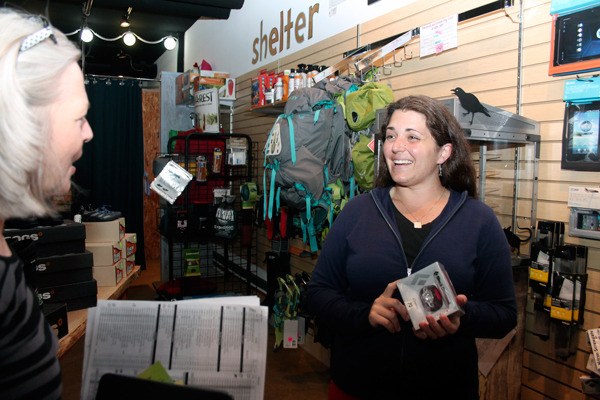Searching for lower rent and more space, Sarah Boin and her husband Patrick may have their ideal space in Langley.
Just up the street from Wander on Whidbey, her Anthes Avenue outdoors shop, the Boins have their sights set on space in the former Living Green building on Second Street and De Bruyn Avenue. To be able to move her business there [which she said is tentative] and open a restaurant [which she said is definite], Boin asked the Langley City Council to consider changing the city’s zoning code Monday night.
She received resounding support from the council, which voted 5-0 to pursue the zoning change.
“You and Patrick are definitely the type of demographic we want to attract to town,” Councilwoman Rene Neff said.
Half of the building’s retail space is run by Kelly Baugh, owner of Sundance Bakery. After taking over the space used by Living Green, she found success with the locally-sourced bakery but had to close for a while to work on her new wood-fire oven. Now, the Boins want to work side-by-side in the same building with Patrick running the restaurant—the Salish Kitchen—and Sarah running her outdoor apparel shop.
“It would be really lovely to be up there feeding people and clothing them for the outdoors,” she told the council.
The zoning code for “neighborhood business” was already rejected by the city’s Planning Advisory Board in a 3-2 vote. Councilman Thomas Gill, who previously served on the planning board, described a neighborhood business as one of professional services rather than retail.
“They’re primarily shops that have very little foot traffic—offices like the professional center on Third Street coming into town,” Gill said in a phone interview Thursday.
“The big difference is simply to have a business that wouldn’t have an impact on the neighborhood,” he added.
At the time, the city was looking for a location that could accommodate the state’s regulations for recreational marijuana retail. None of the spaces in the downtown area worked, but Director of Community Planning Jeff Arango discovered that some commercial areas near the edge of town on Third Street could work, with an amendment to the zoning to allow retail.
One of the planning board’s concerns, Gill said, was that making the zoning change could allow for a strip mall. While most places outside the downtown business core aren’t suitable for such a development, Gill warned that the properties across from Langley Middle School and the fairgrounds could be developed into a strip if the amendment is not carefully worded.
Having the council override or reject a planning board decision is not unheard of, though it is uncommon. Gill could not recall a time when the council completely disregarded the planning board. The council could use its authority to do so if the planning board did not come up with a solution to allow retail in areas outside of downtown. Rising rents are forcing some businesses out and keeping others away, Gill said.
“The PAB is supposed to go through the process of creating what the people want so the council doesn’t have to go through all of that work” Gill said.
Boin said she wanted to be part of an expansion of Langley’s retail. Instead of confining stores to the waterfront and near-waterfront areas where rents can reach $1,000 per month, Gill said it was important for the city to allow for commercial diversity.
“We should have the same rules there as we have in the rest of the city,” Gill said.
Later, he added: “Unlike what most people have been saying, we’ve noticed there’s a lack of affordable retail space downtown. Yes there are some open spaces, but they’re quite expensive.”
No leases have been signed yet. Boin said she hoped the Salish Kitchen, if all goes well, will open in September, and that if she moves, it will likely be in October.



